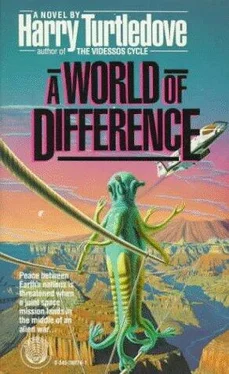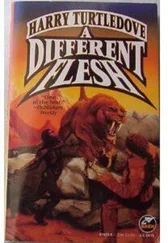“The Skarmer fleet is crossing Jotun Canyon, that’s what, and Oleg Lopatin with them. He has his friend Kalashnikov along, as I suggest you remember when you go to tell him hello. That’s all. Tsiolkovsky out.”
He reached out to switch off the set. His hand stopped, just above the switch. The dials had already gone dark by themselves. His jaw clenched until his teeth ground against one another. Of all the times for a malfunction-
Then he heard footsteps coming up the passageway. Voroshilov paused at the entrance to the control room. He was shaking his head. “That was stupid, Shota Mikheilovich,” he said. “Stupid.”
“What was?” If Rustaveli could brazen it out, he would. “This damned radio seems to have gone out on us. I was just checking it.”
“By calling the Americans.” Voroshilov was not asking a question.
Rustaveli sagged. “I should have known the timing of the breakdown was too good.”
“Yes, you should have,” Voroshilov agreed. “I hope I managed to kill the circuit before you blabbed too much, but I’m not certain. You did surprise me, Shota.”
“I’m so glad,” Rustaveli muttered. Then, one by one, the implications of what had happened began to sink in. “You were monitoring me,” he said slowly. With a dignity curious for one admitting such a thing, Voroshilov nodded. “Which means”-
Rustaveli went on; he had not really needed the nod-“ you ‘re KGB.”
Voroshilov nodded again. “But you will not mention that to anyone else, Shota Mikheilovich. Not to anyone. It is not relevant. I would do this no matter what I was, if I came by and found you at the radio.”
“Why? You hate Lopatin,” Rustaveli blurted. He wondered how that was possible if they were both KGB. He also wondered if it was even true or just a cover the two snoops used.
“Lopatin is a pig,” Voroshilov said flatly. That answered that, Rustaveli thought, or at least proved Yuri an actor as well as a chemist and a spy. After a moment, picking his words carefully, Voroshilov went on. “But he is also following the orders he received both from Colonel Tolmasov and from the Rodina, the motherland. You have no business meddling with his mission.”
“No? What if he or his pet Minervan starts shooting at the Americans? Yuri Ivanovich, one of them risked her neck to fly the canyon and help Valery. Shall I repay that by not even warning them danger is coming their way?”
Voroshilov frowned. He still looked, as he always had, quiet, studious, a little boyish. And underneath it he was a chekist, Rustaveli thought. He swore to himself never to judge by appearances again.
“He may be going into danger, too,” the chemist answered. “Bragg would not tell Sergei Konstantinovich whether he was giving firearms to the Minervans on the far side of Jotun Canyon. Had we been sure he isn’t, maybe Lopatin could have stayed here. As it is, no.”
“Would Katya have wanted you to cut me off?” Before this moment, Rustaveli would never have imagined KGB men susceptible to appeals to their feelings. He could not imagine a chekist going home to a wife he loved, to children perhaps, and plopping down in a chair to complain about the hard day he’d had.
But Yuri was different. Damn it, he had lived almost inside Yuri’s socks for a lot more than a year now. Maybe he was a chekist, but he was not a bad fellow. And Rustaveli would have bet anything anyone cared to name that he did love Katerina.
“I don’t know,” he said now. He was troubled; Rustaveli could see that. But then he nodded toward the silent radio. “Too late to worry about it at the moment, though.” He walked back toward his laboratory-and presumably, Rustaveli thought, toward his microphones and secret switches.
“Shit!” the Georgian said. He slammed a fist against the back of a chair. The thing was padded and did not hurt. “Shit!” he said again.
Chip, chip, chip. Frank Marquard went down on his knees so he could use his geologist’s hammer with greater precision. He had not seen a conglomerate quite this fine-grained before.
Anything new and interesting deserved to be a specimen.
Even through padding, his knees began to freeze. He sighed. He was so sick of being cold. As a lifelong inhabitant of Los Angeles, he had had no practice living in a refrigerator. He remembered somebody on the selection panel asking about that and remembered answering that it would not bother him. He had known he was lying even then. Luckily, the people on the panel had not.
Pat was as Californian as he, but the cold didn’t bother her as much. Or if it did, Frank thought, frowning, she didn’t let on. Not so long ago, that would not have occurred to him. Now he wasn’t so sure what Pat could hold back. He hoped-he thought-he was warming her up again, in a very different sense of the word, but he wasn’t sure.
As he usually did, he tried to make the best of that. He supposed it was all to the good that he wasn’t taking her for granted anymore. Boredom lay down that road.
Out of the comer of his eye, he saw something move. He looked up. Where had the Minervan come from? “What do you here, male of Reatur’s clan?” he asked in the Omalo tongue.
The male did not answer. It came closer. How, Frank wondered, had it got below him without his noticing? Then he saw the spears in the Minervan’s hands.
“Frank!” Louise shouted over and over in Athena’s control room. “Are you there? Come in, Frank!”
“Bozhemoi,” Oleg Lopatin said softly when he saw the stained spears Juksal was displaying.
The warrior was proud of himself. “He had a little hammer with him, but he hardly even got it up before I struck him.” He raised the hand on the far side of his body, showed the Russian the geologist’s tool he had taken from the man he’d slain.
“Bozhemoi,” Lopatin said again. The idea of going to war had been attractive in the abstract. Having a fellow human killed by a Minervan, though, was not really what he had had in mind, no matter how socially advanced the Skarmer were.
“Don’t let your eyestalks droop, Oleg Borisovich,” Fralk said. “You’ve told us how the humans on this side of the gorge are enemies to your great clan.”
“Yes, but-“ Sudden ghastly consequences flowered in Lopatin’s mind. The Americans would assume he had killed their comrade. With the situation reversed, he would have jumped to the same conclusion. When a man with a rifle was around, who would think twice about natives and their spears?
Scowling, he thought furiously. Though the habit of secrecy was deeply grained into him, he decided it could not serve him here. He would have to let Tsiolkovsky know what had happened, and that he had had nothing to do with it. He could not guess how far that would go toward mollifying the Americans, but nothing, now, could be worse than silence.
He thumbed the ON switch of his radio, brought it to his lips. “Calling Tsiolkovsky, calling-“ he began. Then he noticed the SEND light had not gone on. When he switched to mWAVE, no carrier wave hum, no static, came from the speaker.
Hopelessly, he peeled off the back of the set. Water gleamed on the integrated circuits inside. He had tried to keep the radio dry crossing Jotun Canyon, but its case was not waterproof. Who would have thought, on frozen Minerva, it would have to be? He dried the works as best he could, tried again to send. The radio was still dead.
Of course, it had taken a good many bangs, too, as he scrambled up toward the top of the canyon. Without tools he did not have, he could not tell what was wrong with the cursed gadget if nothing obvious like a loose wire leapt out at him. He could not fix anything more complicated than a loose wire, either.
And this, he asked himself bitterly, makes you a modem electronic engineer? The trouble was, it did. But that, at the moment, was the least of the trouble he was in, and he knew it.
Читать дальше












